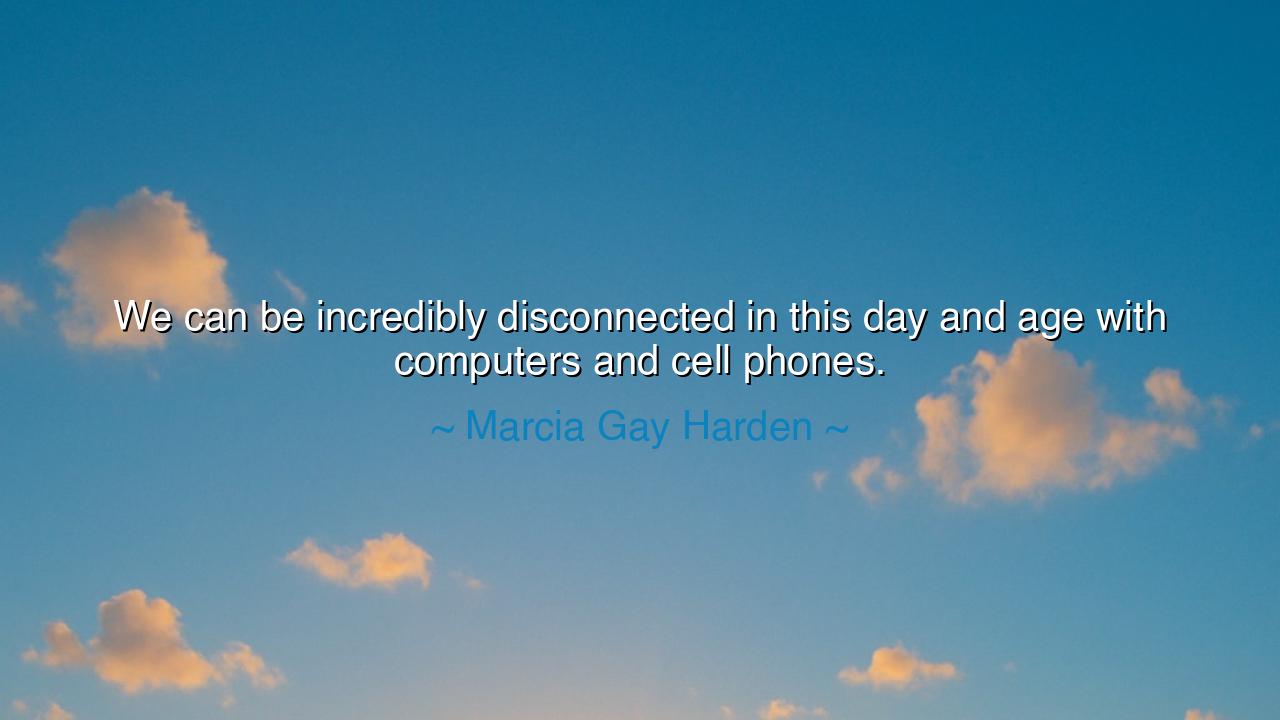
We can be incredibly disconnected in this day and age with






There was a time when human voices rose like music in the air — when neighbors spoke across fences, and families gathered around the fire, sharing stories that wove hearts together. But in this new age, where glowing screens light the faces of millions, Marcia Gay Harden spoke with quiet lament: “We can be incredibly disconnected in this day and age with computers and cell phones.” Her words carry the sorrow of one who has seen how the tools that promise connection often build walls instead. The machines of communication, meant to draw us nearer, have, in subtle ways, led us into loneliness — an invisible wilderness of distraction and silence.
To understand her meaning, we must gaze upon the paradox of our time. Never before have men and women been so instantly connected — across oceans, across languages, across worlds. A message sent from one side of the planet reaches the other in less time than it takes the heart to beat. Yet within this miracle lies a wound: in reaching outward endlessly, we forget how to reach inward and near. Our eyes are ever fixed on glass, our ears tuned to the hum of the digital realm, while the living world — the laughter of a friend, the cry of a child, the whisper of the wind — fades to background noise. Thus, the disconnection she speaks of is not physical but spiritual — the distance between soul and soul in an age of constant signal.
Consider, for a moment, the story of a young man in a crowded city. Each day he walks the same path to work, surrounded by thousands, yet he feels alone. On the train, faces glow blue beneath the cold light of phones, and conversations have been replaced by scrolling. He longs for a voice, a smile, a shared moment of life — yet all are locked within invisible walls. One morning, the train stops, delayed, and in frustration he looks up — and for the first time, meets the eyes of an elderly woman beside him. They speak, awkwardly at first, then warmly, of small things: the weather, the news, her grandchildren. In those few minutes, he feels something he had forgotten — the warmth of human presence. When the train moves again, he realizes the truth: it was never distance that made him lonely, but disconnection from the living heart of others.
Harden’s words echo like a prophecy of warning — that we must not mistake communication for communion, nor data for understanding. The computer and the cell phone are marvels of the mind, but they cannot replace the sacred work of the heart. A message typed lacks the trembling tone of a voice; an emoji cannot hold the softness of a hand. The ancients had none of these devices, yet they possessed something rarer: the art of listening, the patience of being, the courage to sit with another in silence. These are the roots of connection, and they grow not in the cloud, but in the soil of shared humanity.
Let us remember the story of Socrates, who walked the streets of Athens speaking face to face with his students. He sought truth not in scrolls or symbols, but in dialogue — the living exchange of minds and souls. Were he among us now, he might see our brilliance, but also our blindness. He would remind us that wisdom comes not from information, but from intimacy — from the meeting of two spirits unguarded and awake. To be wise, we must be present. To be truly connected, we must put away the tools that separate us long enough to see one another clearly.
Therefore, children of this digital dawn, let these words be your guide: Be present where you are. When you sit with a friend, let your device rest. When you walk beneath the trees, let the world, not the screen, fill your vision. Listen — not for notifications, but for the heartbeat of the moment. Seek not the endless noise of networks, but the quiet truth of one sincere conversation. These small acts are not small at all; they are the sacred rebellion against an age of distraction.
For the greatest connection is not built through wires, but through attention. The heart, when offered wholly, transmits a signal no machine can amplify. Harden’s lament, then, becomes a call — to reclaim what is human, to restore the warmth of presence in a world of cold light. Let us rise to that call. Let us remember that to be truly alive is not merely to be online, but to be awake, together, here, in the glowing mystery of shared existence.






AAdministratorAdministrator
Welcome, honored guests. Please leave a comment, we will respond soon